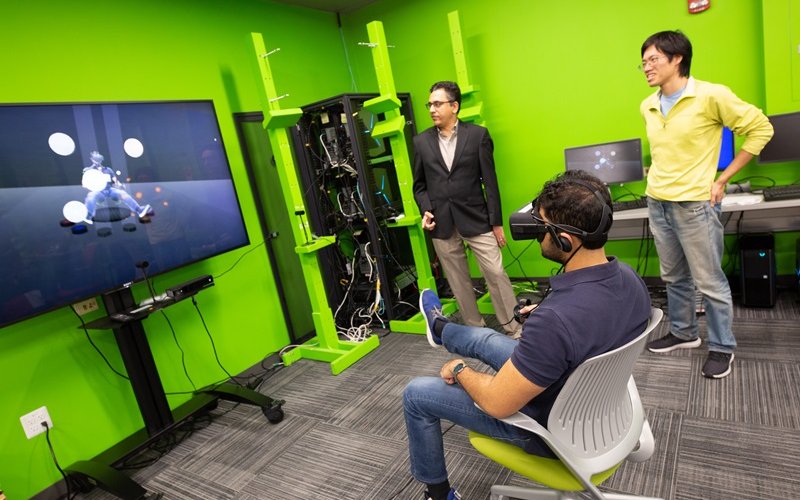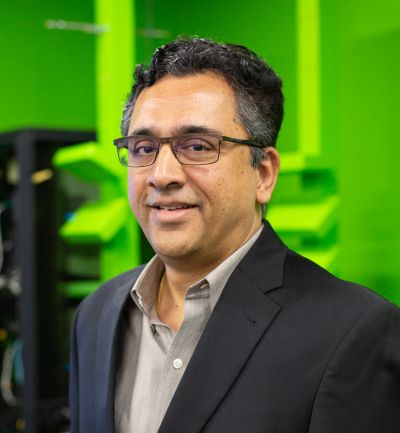Expert in Human-AI Interaction to Lead UAlbany's AI Plus Institute

ALBANY, N.Y. (Oct. 1, 2024) — A well-regarded computer scientist and expert on human-computer interaction has been named the inaugural permanent director of the University at Albany’s AI Plus Institute.
Prabha (Balakrishnan) Prabhakaran will join the Institute in January after more than two decades on the computer science faculty at The University of Texas at Dallas, where he also served as associate vice president for research centers and institutes and director of the
Prabhakaran also served as program director for the National Science Foundation’s Human-Centered Computing Program in the Information and Intelligent Systems Division from 2019-23 and as "theme lead" for the NSF AI Institute on Human-AI Interaction.
"Dr. Prabhakaran is exactly the person we need to harness the full potential of our large and diverse group of faculty dedicated to tackling complex questions related to artificial intelligence,” said Thenkurussi (Kesh) Kesavadas, UAlbany’s vice president for research and economic development. “This Institute is a critical element of UAlbany’s AI Plus strategy because it is the mechanism by which we build diverse teams — philosophers, social scientists, artists and engineers — to compete for funding to solve pressing problems using AI. We are thrilled to have landed a scholar as accomplished as Dr. Prabhakaran, and I am confident the Institute will thrive under his leadership.”
Prabhakaran’s personal research interests focus on the intersection of medicine and data science, including understanding and quantifying human performance to improve human-computer interaction. This work has applications in improved training, rehabilitation and adaptive techniques to overcome challenges like phantom pain and speech and hearing impairments experienced by amputees and stroke survivors. He has also worked extensively in AI-based health care decision-support systems, such as remote monitoring and self-management of conditions like cardio-metabolic diseases, physical medicine and rehabilitation, speech pathology and treatment, and radiation oncology.
'For the Betterment of Humanity'
“With AI permeating almost all walks of human life, we need researchers from all disciplines to come together and transcend their own areas of research to discover new AI techniques that can solve complex problems faced by science, technology and the society,” Prabhakaran said. “Tackling these research questions spanning a wide range of disciplines also requires tremendous computing power. UAlbany’s AI Plus Institute offers the perfect combination of exceptional transdisciplinary research expertise, outstanding supercomputing resources and innovative curricula for training the workforce necessary in a society dramatically changed by AI.
“I am delighted to join UAlbany’s visionary leadership and its excellent researchers and look forward to this exciting journey ahead of us cementing AI Plus’ global leadership in understanding and advancing AI-based systems for the betterment of humanity.”
At UAlbany, Prabhakaran also will hold a faculty appointment as full professor in the Department of Computer Science in the College of Nanotechnology, Science, and Engineering (CNSE).
“We are excited to welcome Dr. Prabhakaran to the Department of Computer Science and the CNSE family,” said CNSE Dean Michele J. Grimm. “Twenty-five college faculty members — fully one-third of our tenured and tenure-track faculty — are conducting research into either the fundamental systems of AI or ways in which AI can support addressing society’s most challenging questions. Dr. Prabhakaran’s extensive background and his multidisciplinary work applying AI to improve patient outcomes will fit very well into CNSE’s research portfolio. Most importantly, his leadership of the AI Plus Institute will open new avenues for research funding and additional opportunities for collaboration across campus, which will benefit the students and faculty across UAlbany and people throughout the Capital Region and New York.”
A Transdisciplinary Approach
Launched in 2023, the AI Plus Institute is an R&D hub that connects faculty engaging with AI-related questions across UAlbany’s nine schools and colleges. In addition to dozens of AI experts already on campus, the Institute’s core membership was buoyed by UAlbany’s unprecedented recent investment in 27 new AI-focused faculty members spanning every school and college in departments from computer and political science to philosophy and epidemiology and biostatistics. The cluster hire was the largest in UAlbany’s history.
As of September 2024, more than five dozen UAlbany AI experts were working on 113 research grants collectively worth $64 million.
Backed by a $75 million infusion of state funding in 2022, UAlbany’s AI Plus initiative is a holistic approach to integrating teaching and learning about AI throughout every academic and research program. It is grounded in the conviction that all students should graduate prepared to live and work in a world radically changed by technology.
Later this month, the University will unveil its new on-campus AI supercomputer, which is among the most capable at any U.S. university and will empower researchers to tackle problems so complex that they need extraordinary computational muscle behind them.
The AI Plus Institute was launched under the leadership of Interim Director Eric Stern, professor in the Department of Emergency Management & Homeland Security in the College of Emergency Preparedness, Homeland Security and Cybersecurity.





